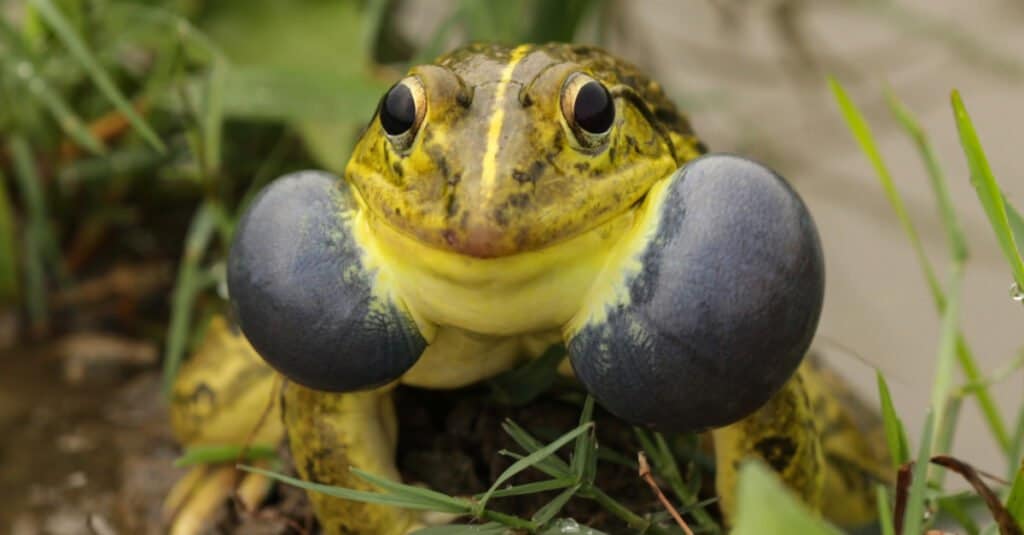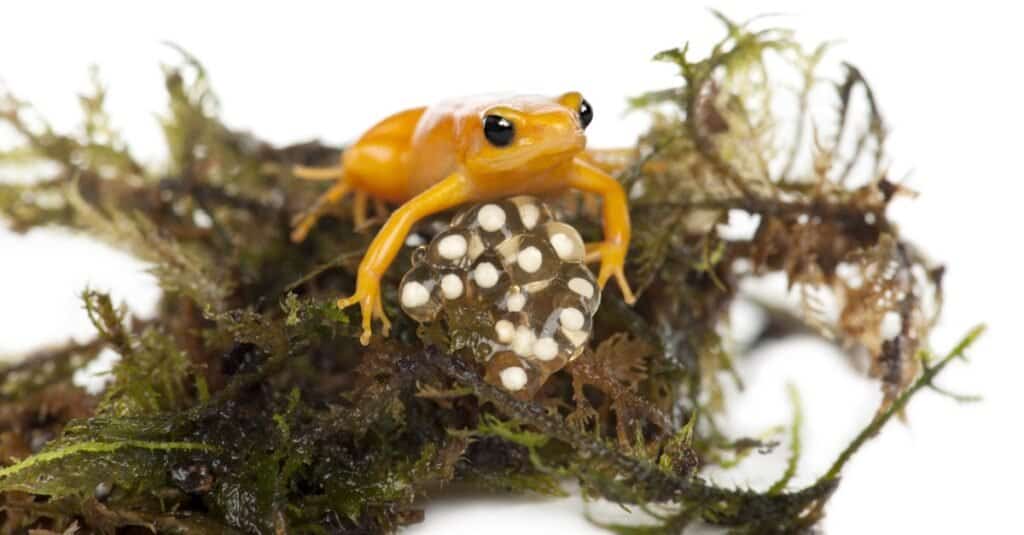Why do frogs croak or ribbit, and are they different things?
Croaks and ribbits are the same vocalization. They’re simply two different words used to describe the same thing.
Male frogs ribbit to find mates. Males and females will ribbit if startled, injured, or to protect their territory. Usually, the frogs you hear at night or in the rain are males.
In this article, we’ll discuss everything from why frogs ribbit to their mating process, when frogs croak, and more!
Why do Frogs Ribbit?

Male frogs ribbit to find mates.
©ThulungPhoto.com/Shutterstock.com
Frogs usually croak or ribbit to find mates. When male frogs croak, and they’re doing so to attract females to themselves!
The most common place to hear frogs is near bodies of freshwater. For instance, if you live near a pond, you may hear frogs chirping through the night!
Most frogs are nocturnal. You might hear the most frog sounds in the spring and summer since this is their mating season—although some frog species mate year-round or in the winter.
Lastly, if you’re looking to hear your local frogs, try going outside at night on a rainy day. Frogs might call out before, during, or after the rain, because it’s the best time for females to lay eggs.
Other reasons frogs might ribbit are to mark territory or when they’re scared or in pain (such as when grabbed by a predator).
Do Only Male Frogs Croak?

Males will often ribbit after rains because its the best time for females to lay eggs
©Eric Isselee/Shutterstock.com
Male frogs croak most often, but females might also croak occasionally.
Chances are, the frogs you hear singing outside your home are male. But female frogs may ribbit to mark territory or as a “yelp” of pain or surprise.
Most times, females are the quieter frog gender. They are attracted to males and their songs, and choose a mate based on how well they sing!
Once she’s chosen a male, he will wrap his body around hers. As she lays her eggs, the male frog will fertilize them outside of her body.
Males may cling to females long before they lay their eggs, though, and the female will have to carry them around for days, weeks, or months.
During this time, other males may try to fight for the female’s attention and knock her mate away from her.
This is the way most frogs mate, although, with so many species, some of them have different methods.
How do Frogs Communicate?
Frogs communicate through ribbits, as discussed in previous sections. However, it’s not their sole method of communication.
They also use touch, body language, and other vocalizations to speak to one another.
The species Hylodes japi has a very intricate language, and these frogs might even wave their arms around to get another frog’s attention! They’ve also been seen tapping their feet and shaking their heads.
Diurnal frogs are more likely to use signals like this than nocturnal frogs, who are more likely to use vocalizations as their primary means of communication.
Other vocalizations you might hear a frog make include squealing to defend territory, chirping, and squeaking. Some frogs sound like crickets when they croak since they’re so tiny!
Do Different Frogs have Different Croaks?

Frog species have unique croaks that help them identify other members of their species easier.
©iStock.com/Jennifer Sophie
Each frog species has a unique croak. This helps them to identify others of the same species, saving them a lot of time when it comes to mating.
While frogs can interbreed with other frog species, it’s uncommon and results in offspring that cannot reproduce as easily. Some are even completely infertile.
Therefore, it’s best for them to stick to the same species.
Their unique ribbits also mean that finding out which frog species live in your area is possible based on the sounds they make. This can help to identify local frogs without having to see or disturb them, and may also give you an indication as to when the croaking will stop if you’re bothered by it.
When do Frogs Stop Croaking?
Male frogs can be quite insistent when looking for a mate. They call out loudly, usually at night, and some people find these lovebirds and their songs more irritating than sweet!
You may wonder when the frogs outside your home will stop croaking. Frogs usually begin croaking around sunset and stop a few hours before sunlight. They don’t want to draw attention to themselves once the birds are awake!
When it comes to the seasons, it’s difficult to offer an answer without knowing the species of frog. If the croaking just began and it is spring or summer in your area, rest assured that the frogs should quiet down once the weather cools.
The same goes for frogs that have only become active in the winter season—once their mating season is over, you won’t have to hear them anymore.
Unfortunately, though, there are also frogs that mate year-round. If these frogs are on your nerves with their constant serenades, you might want to invest in some earplugs or a white noise machine!
Why do Frogs Croak so Loudly?

Males frogs are louder because they have both a vocal cord and a vocal sac.
©kyslynskahal/Shutterstock.com
Another question those of you who are up listening to mating calls may ask is, why are they so loud? The simple answer is, so females can hear them!
The more scientific answer is that males have both vocal cords and a vocal sac. Vocal cords allow them to make noise, just like we use our vocal cords to talk. The vocal sac amplifies a frog’s voice so that they can be heard from far away, ensuring they find a female to mate with.
Frogs can be heard up to one mile away—so if you’re nearby, you’re sure to get an earful!
The photo featured at the top of this post is © iStock.com/Linas Toleikis
Thank you for reading! Have some feedback for us? Contact the AZ Animals editorial team.






